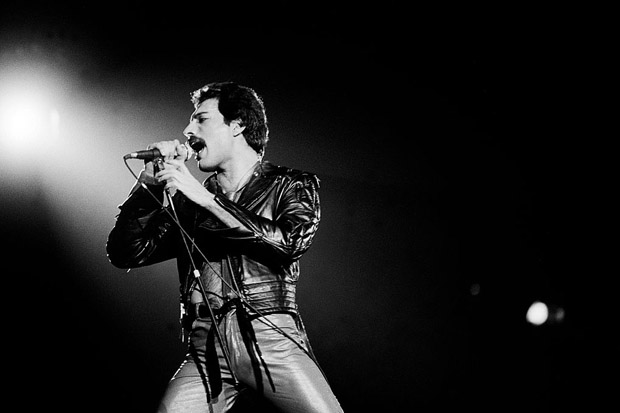Thirty years ago this week, Queen performed what would turn out to be their last gig, at Knebworth. Their penultimate concert, at Wembley, was shown on Channel 4. I recorded it, and became obsessed. Time after time I watched-Freddie Mercury prance on to the stage sporting a moustache you could have swept a factory floor with. I watched him simulate the act of self-love with his famous sawn-off mic stand. I watched him preen, pout and posture, shaking his backside at the crowd, reappearing at the end dressed as the Queen. The previous year I’d watched him at Live Aid wearing a skimpy white vest and a leather armband studded with metal. Not once did it occur to me that-Freddie Mercury was gay.
Those of you born since then-probably won’t believe that. Twentysomethings just don’t understand how anyone older than them can not have been aware of gay-culture. But we weren’t. Plenty has been written by gay people about what it was like growing up back then, having to hide their true nature. But the under-reported corollary was that the rest of us didn’t know what was being hidden.
I was born in 1971, just four years after homosexuality was decriminalised in England and Wales. I would be nine before it was legal in Scotland, 11 in Northern Ireland. Looking back at 15 year-old me, it’s incredible that I could have been so unobservant about the Freddie I adored. The band was called Queen, for God’s sake. But I promise you that’s how it was. Things had been the same in 1982, when Culture Club made their first appearance on Top of the Pops. At school the next day the smart kids delighted in telling the rest of us that the lead singer was actually a man, but I don’t think even they thought about Boy George being gay. We just assumed he liked-wearing make-up.
Back then homosexuality was handy in the abuse stakes: ‘queer’, ‘bender’, all the other witticisms. So I suppose we must have known in theory that some people really were gay — but who? Oscar Wilde, Noël Coward: yes, we’d heard of them, but the question of whether a living celebrity could be gay simply didn’t arise. In 1984 Elton John got married to a woman. Perhaps he was-trying to deny things to himself. Just as Freddie Mercury had once split from his girlfriend, saying he thought he was bisexual. ‘No, Freddie,’ she replied. ‘I think you are gay.’
As ever with human relations, the girls were probably ahead of us. When my-memory replays my grandmother’s laughter at the comedian Larry Grayson I can see she knew what the score was. But I didn’t see it at the time, and certainly no one talked about it. (Youngsters — search out some Grayson on YouTube. You will wet yourselves at my naivety.) Freddie Mercury never came out, and only felt able to confirm that he had Aids 24 hours before his death in November 1991. The previous month, starting my final year at university, I’d met a man who’d offered to help when I moved to-London the following spring. He was a-writer who could provide me with some research work, and introduce me to possible employers in the media. Passing on this good news to my family, I felt obliged to add the supplementary information ‘…and by the way, he’s gay.’ Their laughter and comments of ‘watch yourself’ weren’t an indication of any real homophobia, merely a reflection of the age.
So when did attitudes change? As so often with these things, it happened-amazingly quickly. George Michael’s 1998 outing following his ‘lewd act’ in a Los Angeles public lavatory was massive news. (I know, youngsters — I can feel the breeze caused by your headshakes of amazement.) Yet only four years later Will Young won the first Pop Idol, said he was gay and the nation’s eyelids remained unbatted.
This piece isn’t meant as a celebration of gay equality: as I say, it wasn’t my fight. Rather it’s a reflection on how much things can change, how different a society can be, how bizarre the mindsets of a previous time can appear just a few years down the line. There’s something rather exciting about that, something that makes you look to the future as well as the past. How will Britain be different in 30 years from now? Which of today’s givens will have been taken away? Based on my experience of Freddie Mercury, you can forget trying to answer that — we won’t even know the right questions to ask yet.
The post Straight talking appeared first on The Spectator.
Got something to add? Join the discussion and comment below.
Get 10 issues for just $10
Subscribe to The Spectator Australia today for the next 10 magazine issues, plus full online access, for just $10.
You might disagree with half of it, but you’ll enjoy reading all of it. Try your first month for free, then just $2 a week for the remainder of your first year.














Comments
Don't miss out
Join the conversation with other Spectator Australia readers. Subscribe to leave a comment.
SUBSCRIBEAlready a subscriber? Log in